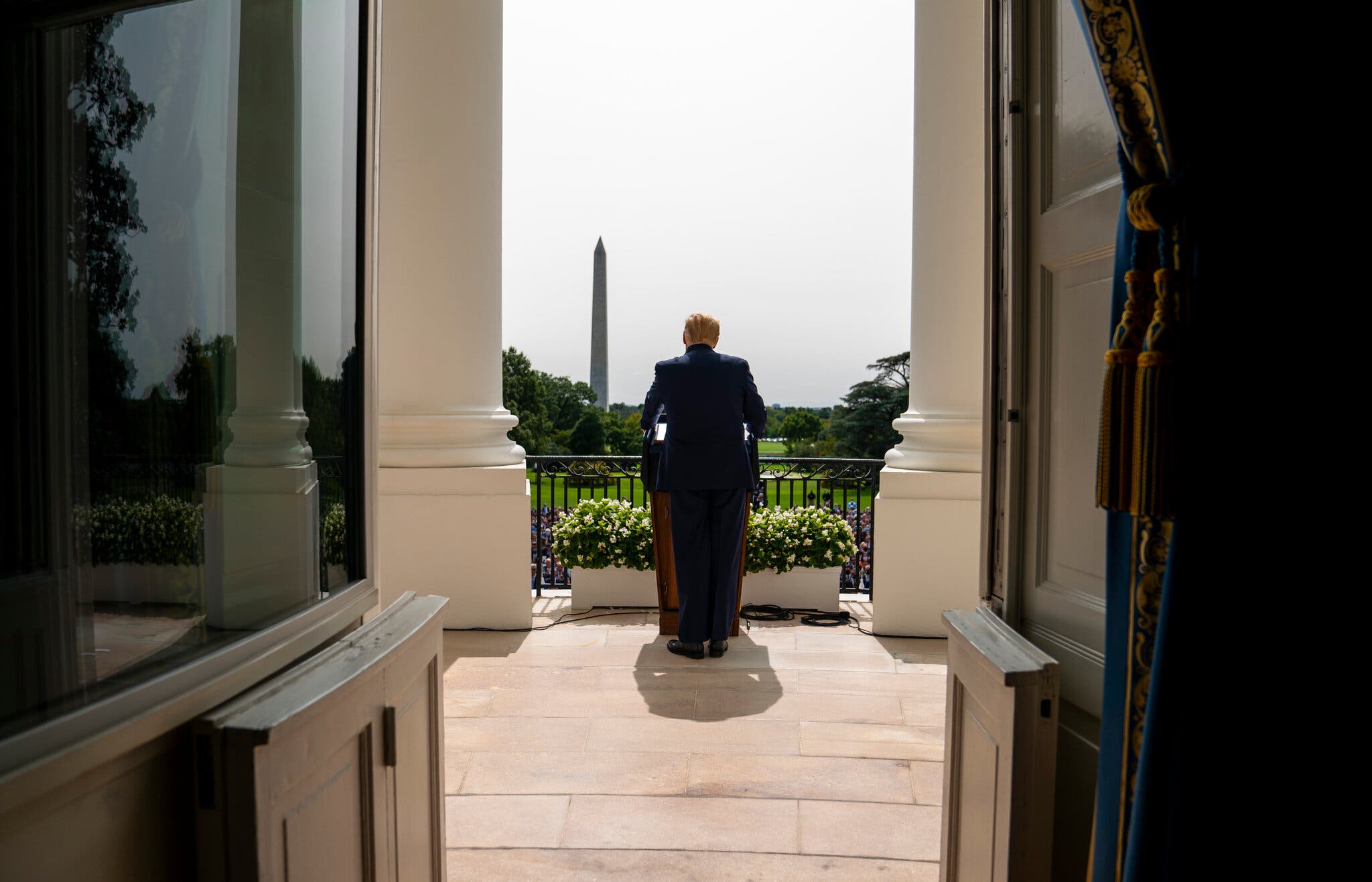The Geopolitical Fallout Of Trump's Middle Eastern Visit

Table of Contents
Impact on the Iran Nuclear Deal
Renegotiation Attempts and Subsequent Withdrawal
Trump's administration consistently criticized the Joint Comprehensive Plan of Action (JCPOA), also known as the Iran nuclear deal, viewing it as insufficiently restrictive on Iran's nuclear ambitions. This criticism formed the cornerstone of his foreign policy towards Iran. The administration repeatedly attempted to renegotiate the deal, demanding stricter terms and a broader scope encompassing Iran's ballistic missile program and regional activities. These attempts ultimately failed, culminating in the US withdrawal from the JCPOA in May 2018.
- Specific Criticisms: The Trump administration cited the sunset clauses of the agreement, the lack of sufficient inspections, and Iran's continued support for regional proxies as major concerns.
- Impact on International Sanctions: The US withdrawal triggered the re-imposition of stringent economic sanctions against Iran, severely impacting its economy and its ability to participate in international trade.
- Reaction of Other Signatory Nations: The remaining signatory nations—China, France, Germany, Russia, and the UK—expressed deep regret over the US withdrawal and continued their commitment to the agreement, albeit with diminished effectiveness due to the absence of the US.
Regional Security Implications
The US withdrawal from the JCPOA significantly escalated regional tensions. Iran, feeling less constrained by international agreements, responded by accelerating its uranium enrichment program, exceeding the limits previously agreed upon. This action fueled further concerns about Iran's nuclear ambitions and destabilized the region.
- Increased Regional Proxy Conflicts: The heightened tensions led to an increase in proxy conflicts across the region, particularly in Yemen, Syria, and Iraq, exacerbating existing humanitarian crises and fueling instability.
- Role of Other Regional Powers: The withdrawal reshaped the regional power dynamic, leading to increased involvement from other regional powers like Saudi Arabia and Russia, further complicating the situation.
- Impact on Oil Prices: The heightened geopolitical risks and uncertainties surrounding Iran's nuclear program and regional actions had a significant impact on global oil prices, causing volatility in the energy markets.
Reshaping Alliances in the Middle East
Saudi Arabia and the Abraham Accords
Trump's visit to Saudi Arabia marked a significant strengthening of US-Saudi relations. This included substantial arms deals and increased strategic partnerships focused on counter-terrorism and regional security. This strengthened alliance played a significant role in facilitating the Abraham Accords.
- Specific Agreements: The visit resulted in multi-billion dollar arms deals and agreements on counter-terrorism cooperation.
- Economic Partnerships: Economic partnerships between the US and Saudi Arabia were strengthened, signifying deeper economic interdependence.
- Impact on Regional Dynamics: The strengthened US-Saudi alliance significantly impacted the regional power balance, influencing relations with other countries in the region. The Abraham Accords, which normalized relations between Israel and several Arab nations, were significantly influenced by this stronger US-Saudi partnership.
Shifting Dynamics with Israel and Palestine
Trump's visit and subsequent policies significantly impacted the Israeli-Palestinian conflict. While his administration took steps to strengthen ties with Israel, including moving the US embassy to Jerusalem, his approach to the peace process remained highly controversial.
- Changes in US Foreign Policy: The Trump administration's approach differed significantly from previous administrations, favoring a more transactional approach to the Israeli-Palestinian conflict.
- Potential Impacts on Settlement Expansion: The administration's policies were perceived by some as tacitly supporting Israeli settlement expansion in the West Bank, further complicating prospects for a two-state solution.
- Response from Palestinian Authorities: The Palestinian Authority criticized the Trump administration's policies, viewing them as biased towards Israel and detrimental to the peace process.
Global Perception of American Leadership
Criticism and Backlash
Trump's visit and subsequent policies generated significant international criticism. His approach to diplomacy, often characterized as unilateral and transactional, contrasted sharply with the multilateral approach favored by many international partners.
- Specific Examples of International Criticism: Many international organizations and nations criticized the withdrawal from the JCPOA, the recognition of Jerusalem as Israel's capital, and the administration's broader approach to international cooperation.
- Different Perspectives from Various Countries: Criticism came from a broad spectrum of nations and international organizations, reflecting diverse perspectives on the Middle East conflict and US foreign policy.
Long-term Impact on US Credibility
The geopolitical fallout of Trump’s Middle Eastern visit has had a lasting impact on US global standing and its relationships with allies. His policies, often perceived as unpredictable and inconsistent, raised concerns about the reliability of the United States as a global partner.
- Changes in Global Trust: The Trump administration's policies eroded trust among some traditional allies, impacting international cooperation on issues ranging from climate change to global security.
- Long-term Effects on Diplomatic Relations: The strained relationships with key allies require significant effort to rebuild, potentially taking years to restore to previous levels of trust and cooperation.
- Shifts in International Power Dynamics: The shifts in alliances and the diminished US role in certain international agreements have altered the international power dynamic, potentially empowering other global actors.
Conclusion
Trump's Middle Eastern visit had a profound and lasting impact on the geopolitical landscape. The decisions made during and after this visit, particularly regarding the Iran nuclear deal and regional alliances, continue to shape the complex dynamics of the Middle East and beyond. Understanding the geopolitical fallout of Trump's Middle Eastern visit is crucial for analyzing current international relations and predicting future developments. Further research into the long-term effects of his policies on regional stability and global power balances is essential. We need to continue monitoring the ongoing geopolitical fallout and its ripple effects on international relations. The ramifications of these decisions continue to be felt today, highlighting the lasting impact of this pivotal moment in Middle Eastern geopolitics.

Featured Posts
-
 Dodgers Bet On Conforto Mirroring Hernandezs Impact
May 18, 2025
Dodgers Bet On Conforto Mirroring Hernandezs Impact
May 18, 2025 -
 How To See Taylor Swifts Eras Tour Wardrobe Up Close Photos And Details
May 18, 2025
How To See Taylor Swifts Eras Tour Wardrobe Up Close Photos And Details
May 18, 2025 -
 Claim The Best No Deposit Bonuses In April 2025
May 18, 2025
Claim The Best No Deposit Bonuses In April 2025
May 18, 2025 -
 Htb Alhrb Ela Nar Alsrae Altwyl Thlyl Memq
May 18, 2025
Htb Alhrb Ela Nar Alsrae Altwyl Thlyl Memq
May 18, 2025 -
 Negotiations Collapse Jbs Jbss 3 Walks Away From Banco Master Deal
May 18, 2025
Negotiations Collapse Jbs Jbss 3 Walks Away From Banco Master Deal
May 18, 2025
